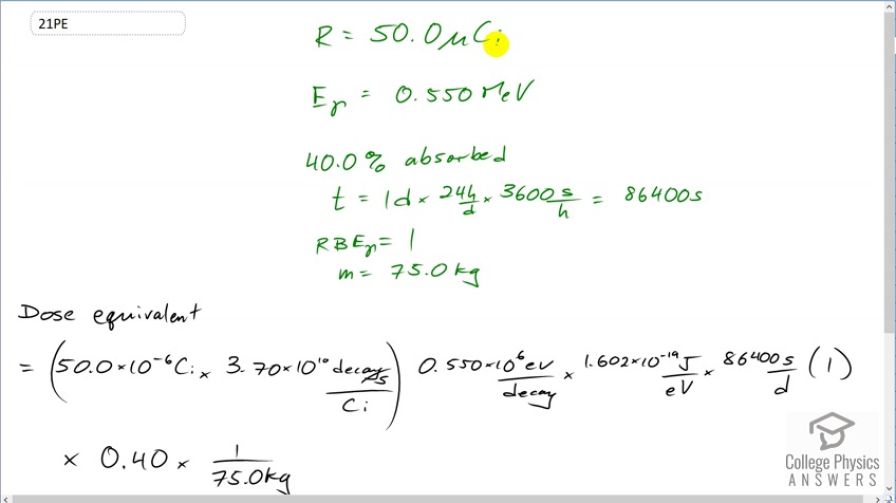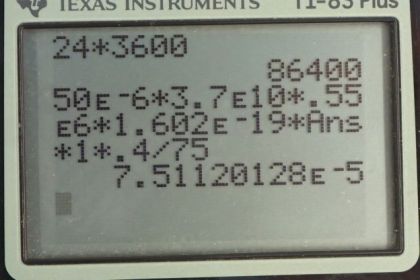Question
Large amounts of are produced in copper exposed to accelerator beams. While machining contaminated copper, a physicist ingests of . Each decay emits an average -ray energy of , 40.0% of which is absorbed in the scientist's 75.0 kg body. What dose in mSv is caused by this in one day?
Final Answer
Solution video
OpenStax College Physics for AP® Courses, Chapter 32, Problem 21 (Problems & Exercises)

vote with a rating of
votes with an average rating of
.
Calculator Screenshots
Video Transcript
This is College Physics Answers with Shaun Dychko. When a physicist is machining some contaminated copper, they end up ingesting 50 microcuries worth of zinc-65. So an amount of zinc-65 we don't know what the mass is but it doesn't matter for this question; what matters is the activity that it has which is 50 microcuries. And we want to find the dose equivalent that this physicist gets each day as a result of ingesting this zinc-65. So we need to know the amount of energy per decay which is 0.550 megaelectron volts and these are gamma rays which is important to know because we need to know what the relative biological effectiveness of the type of radiation it has and so since we know it's gamma rays, the answer is 1 and that comes from table over here table [32.2], gamma rays is 1. And we know that 40 percent of the gamma rays emitted by the zinc-65 is absorbed by the physicist's body. And the physicist is 75 kilograms and we'll assume the radiation is distributed evenly over the entire mass of the physicist and the time that we are interested in is the dose equivalent per day so we need to convert this day into seconds though in order to have mks units. So we multiply 1 day by 24 hours per day and then by 3600 seconds per hour. OK So the dose equivalent then is going to be the activity which we convert into mks units of decays per second or also known as becquerels. So 50 microcuries expressed as times 10 to the minus 6 curies is multiplied by 3.7 times 10 to the 10 decays per second for every curie. Then we multiply that by the energy per decay which we are told is 0.550 megaelectron volts that's 0.550 times 10 to the 6 electron volts per decay and then convert that into joules and then multiply it by the duration of the exposure the number of seconds per day and then multiply that by the relative biological effectiveness of 1 and then multiply further yet by only 40 percent of the radiation being observed by the person's body and then multiply by 1 over 75 kilograms. So we are getting this dose per kilogram in order to have units of sieverts. OK So that's 7.51 times 10 to the minus 5 sieverts but the question asks us to express our answer in millisieverts per day. So I guess technically this is a per day here. So we multiply by 1000 millisieverts per sievert giving us 0.0751 millisieverts per day is the dose equivalent resulting from ingesting 50 microcuries of zinc-65.
